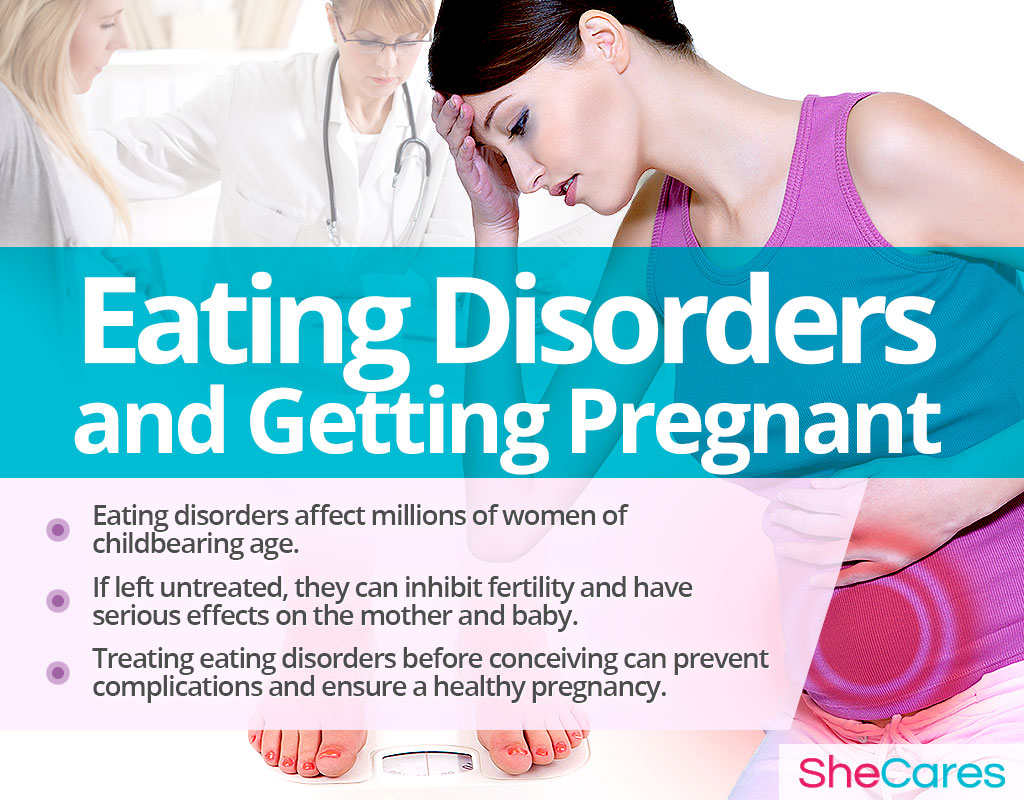Brief Overview of Eating Disorders
Eating disorders are debilitating psychiatric illnesses marked by abnormal eating patterns and distorted perception of one's weight and self-image. They fall into three types:
Anorexia nervosa. Women perceive themselves as overweight, even if they are severely underweight. Obsessive thoughts about food and weight prompt them to decrease their food intake, use laxatives, and exercise excessively.
Bulimia nervosa. Women uncontrollably consume very large meals, which then makes them feel guilty and ashamed. To prevent weight gain, they induce vomiting, or purging, use laxatives and diuretics, and undergo drastic fasting.
Binge eating disorder. Women lose control over the amount of food they eat, which leads to overweight or obesity. Having excess weight causes feelings of shame, which — in turn — trigger more binge-eating attacks.
Effects of Eating Disorders on Pregnancy
Effects of Eating Disorders on Fertility
Eating disorders typically cause menstrual abnormalities, including absent or irregular menses, poor egg quality, and ovarian failure, all of which might lead to infertility. The possible causes include:
Hormonal imbalance due to calorie restrictions and excessive exercise
Nutritional deficiencies due to poor diet and induced vomiting
Low or excess body fat percentage that leads to abnormal estrogen levels in the body
Ovarian suppression to pre-pubertal state
Effects of Eating Disorders on the Mother and Baby
Women suffering from bulimia, anorexia, and binge eating during pregnancy are at a higher risk of anemia, malnutrition, dehydration, C-section, high blood pressure, and gestational diabetes. Also, they suffer from post-partum depression.
Maternal eating disorders can also negatively affect the baby, causing abnormally low (in the case of anorexia and bulimia) or high birth-weight (in the case of binge eating), birth defects, malnutrition, and respiratory distress.
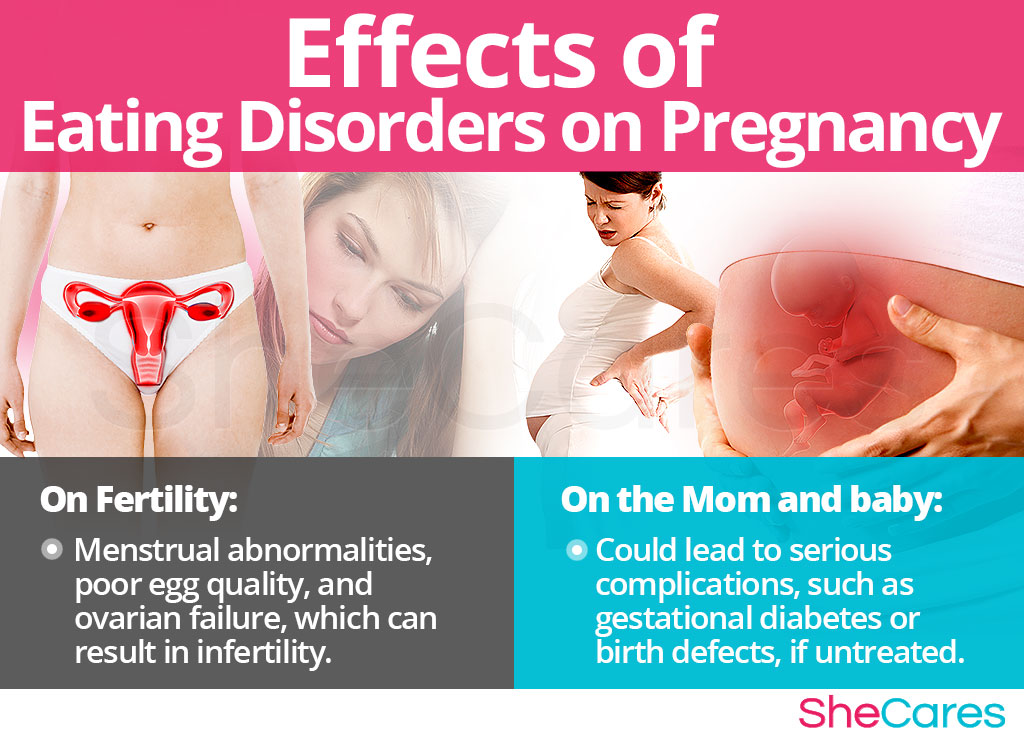
Risks and Complications
Untreated eating disorders during pregnancy might lead to miscarriage, premature birth, or stillbirth.
Action Plan
Months Prior to Conceiving
Your goal before getting pregnant is to give your body proper nutrition, reach a healthy weight, and regulate your menstruation.
Preconception counseling
It is a necessary first step in managing your eating disorder. Your doctor or a licensed dietician will help you determine your target weight and will give you guidance on how to compose your meals to maintain an adequate calorie intake.
Treatment
The majority of women need professional help in overcoming their disorder, such as:
Psychotherapy, such as cognitive-behavioral therapy, will help you replace your distorted self-image with a more constructive and objective one.
Maudsley approach, which is a family-based form of therapy, has also been shown effective in managing eating disorders.
Medications, such antidepressants, can sometimes be used to treat eating disorders and relieve symptoms of depression and anxiety.
Healthy Diet
Learn to replace unhealthy eating patterns with a balanced diet. Good food choices ensure proper calorie intake and sufficient nutrition. They should be a mix of fruits, vegetables, lean protein, full-fat dairy, and whole grains, and include:
Probiotics to restore your digestive tract and boost fertility: yogurt, kefir, and kombucha.
Phytoestrogens-rich foods to balance hormones and increase fertility: tomatoes, lentils, flax seeds, and broccoli.
Foods that improve eggs' quality to optimize your chances of conceiving: pumpkin or sesame seeds, cinnamon, and Brazil nuts.
Omega-3 fatty acids to regulate your periods and make you more fertile: nuts, avocado, and salmon.
Water to prevent dehydration and make your cervical mucus more sperm-friendly. Add some slices of fruits for an extra vitamin boost.
Vitamins and Supplements
Hormone-regulating supplements, such as Macafem, can be essential in balancing your hormones and restoring your menstrual cycle.
Prenatal vitamins, such as folic acid, are necessary to prepare your body for pregnancy and prevent birth defects.
Other vitamins and minerals, such as vitamin D, B-complex, calcium, zinc, and magnesium supplements, can resolve deficiencies, which are common with eating disorders and affect glucose levels, fertility, and overall metabolism.
Adequate exercise
Women with anorexia, bulimia, or binge eating disorder often tend to exercise excessively in fear of weight gain. The level of physical activity has to be customized to their individual health status so they can benefit from their fertility-boosting properties more efficiently.
If you are underweight, focus on exercises that build and strengthen muscles, such as yoga or Pilates.
If you are overweight and trying to lose weight to boost fertility, focus on cardio workouts to promote fat burning. Dancing and swimming are great options.
Good Habits
Establish a reliable connection with your doctor and psychotherapist so they can continue monitoring you once you get pregnant.
Surround yourself with people you can count on if you need more support. Many women feel ashamed of their bodies and tend to hide their eating disorder from their family members.
Quit your addictions to cigarettes, alcohol, and illegal drugs as they decrease the quality of your eggs and might cause birth defects.
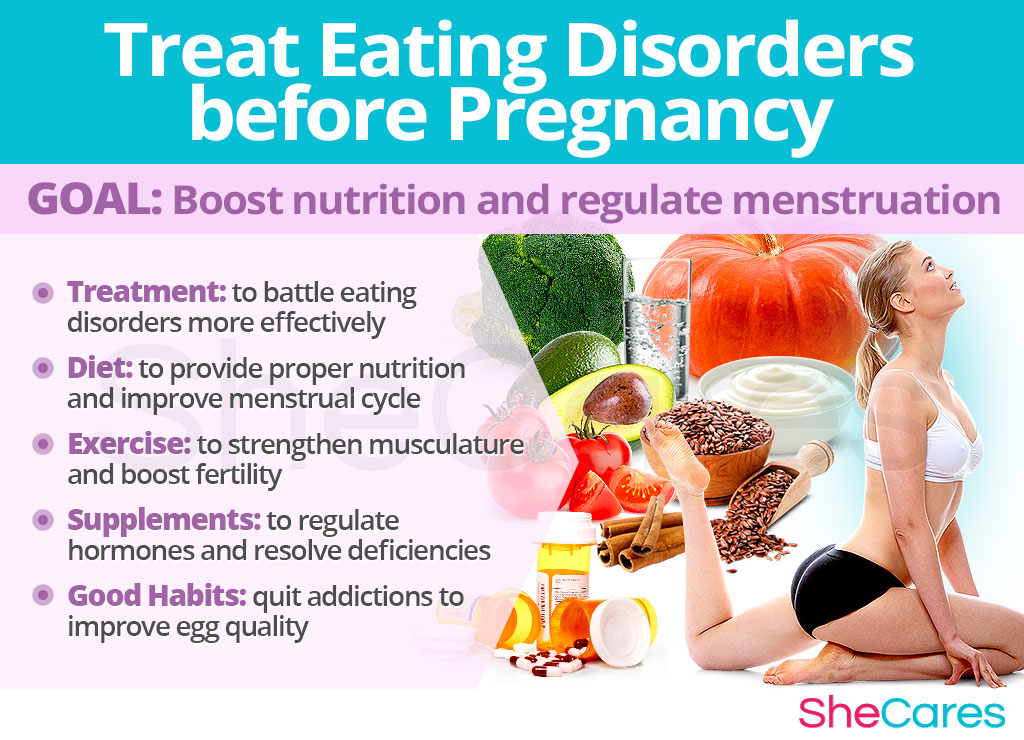
Tips for Conceiving with Eating Disorders
Battling eating disorders is stressful, and so is conceiving for some couples. As you attempt to get pregnant, don't forget to:
Try breathing exercises or meditation to de-stress, collect your thoughts, and pass through your days with inner peace.
Add some full-fat dairy such as milk, yogurt, or cheese into your daily meals to enhance ovulation.
Have sex four to five days before and on the day of ovulation to increase your chance of conceiving.
Get enough sleep because its lack can significantly inhibit your fertility and cause anxiety.
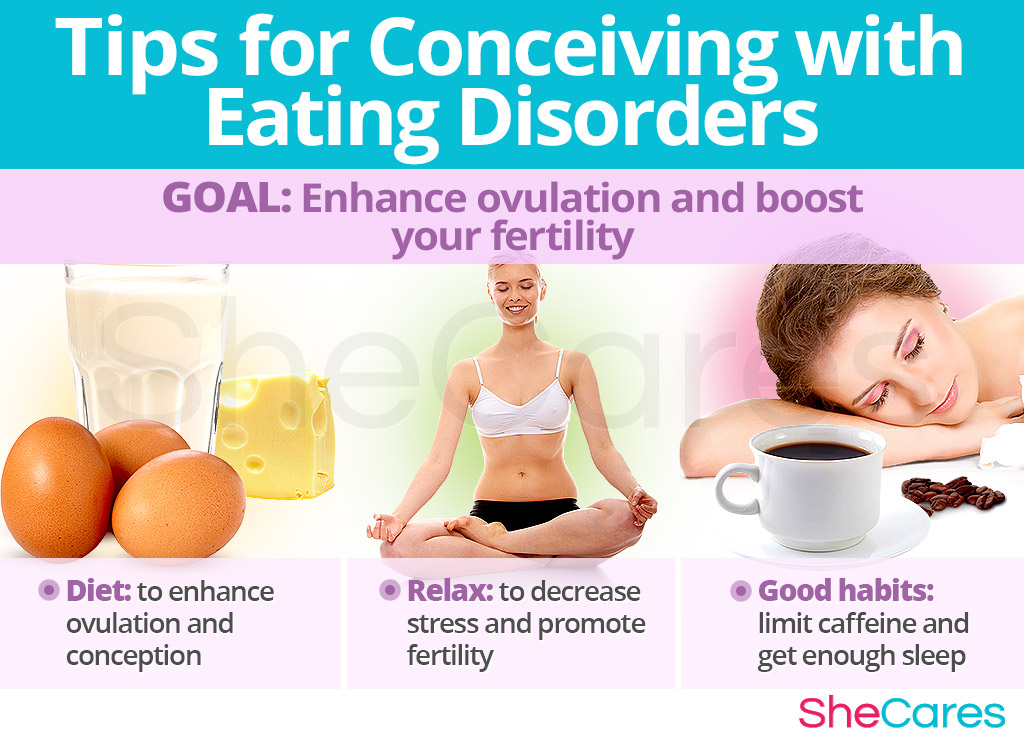
Manage Eating Disorders during Pregnancy
Once you successfully conceive, continue your good habits from pre-conception and keep in mind that:
Weight gain during pregnancy is normal and expected, especially in the third trimester.
Keep a steady calorie intake to ensure that you are gaining weight slowly and within a healthy range to support your baby's nutritional needs.
Upon delivery, many women with eating disorders suffer a relapse. So, it is important to stick to a healthy diet and controlled exercise, especially if you are breastfeeding.
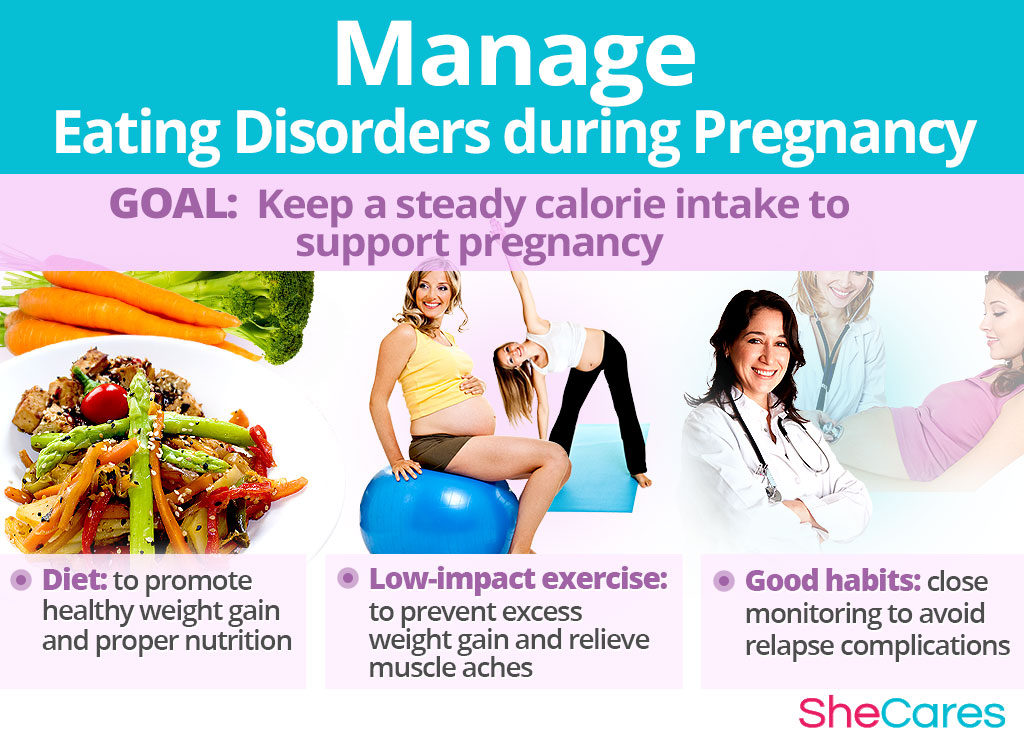
Key Takeaways
Understandably, pregnancy is a very demanding time for all women, and those with eating disorders and self-image problems might be conflicted between the limitations of their disease and their maternal instincts. Untreated anorexia, bulimia, and binge eating during pregnancy can put you and your baby's health at serious risk. Fortunately, help is within reach to fulfill all your needs as you combat your unhealthy eating patterns with therapy, medications or supplements, like Macafem, and a nutritionally-dense diet that will not only restore your body inside out, but also prepare it to give life to your baby.
Sources
- Eating Disorders. (2017). Eating disorders and pregnancy. Retrieved December 22, 2017 from https://www.eatingdisorders.org.au/eating-disorders/eating-disorders-children-teens-and-older-adults/eating-disorders-pregnancy
- Expert Review Obstetrics Gynecology. (2012). Reproductive issues in anorexia nervosa. Retrieved December 22, 2017 from https://www.ncbi.nlm.nih.gov/pmc/articles/PMC3192363/
- Journal of Obstetric, Gynecologic, and Neonatal Nursing. (2005). Reproductive Health in Women with Eating Disorders. Retrieved December 22, 2017 from http://www.jognn.org/article/S0884-2175(15)34260-X/pdf
- National Institute of Mental Health. (2014). Eating Disorders: About More Than Food. Retrieved December 22, 2017 from https://www.nimh.nih.gov/health/publications/eating-disorders/index.shtml
- South Australian Maternal and Neonatal Clinical Network. (2014). South Australian Perinatal Practice Guidelines – Eating disorders and pregnancy. Retrieved December 22, 2017 from http://www.sahealth.sa.gov.au/wps/wcm/connect/a13c27004ee217a7b435bdd150ce4f37/Eating+disorders+and+pregnancy+PPG_June2014.pdf?MOD=AJPERES&CACHEID=ROOTWORKSPACE-a13c27004ee217a7b435bdd150ce4f37-lPTtvFS
- The North American Society for Pediatric and Adolescent Gynecology. (2014). Eating disorders in adolescents and young adult women: Implications for reproductive health. Retrieved December 22, 2017 from http://contemporaryobgyn.modernmedicine.com/contemporary-obgyn/content/tags/adolescent-gynecology/eating-disorders-adolescents-and-young-adult-w?page=full
- The Science Journal of the Lander College of Arts and Sciences. (2014). Eating disorders: the Hidden Hormonal Effect on Fertility. Retrieved December 22, 2017 from https://touroscholar.touro.edu/cgi/viewcontent.cgi?referer=https://www.google.com.pe/&httpsredir=1&article=1080&context=sjlcas
- University of Maryland. (n.d.). Eating disorders. Retrieved December 22, 2017 from http://www.umm.edu/health/medical/reports/articles/eating-disorders
- Women's Health. (2017). Anorexia nervosa. Retrieved December 22, 2017 from https://www.womenshealth.gov/a-z-topics/anorexia-nervosa
